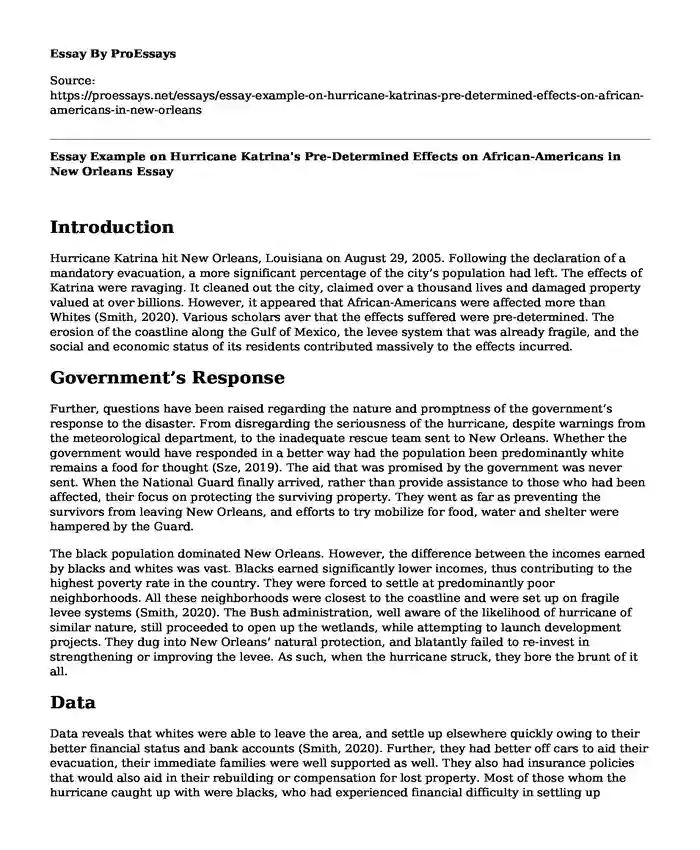Introduction
Hurricane Katrina hit New Orleans, Louisiana on August 29, 2005. Following the declaration of a mandatory evacuation, a more significant percentage of the city’s population had left. The effects of Katrina were ravaging. It cleaned out the city, claimed over a thousand lives and damaged property valued at over billions. However, it appeared that African-Americans were affected more than Whites (Smith, 2020). Various scholars aver that the effects suffered were pre-determined. The erosion of the coastline along the Gulf of Mexico, the levee system that was already fragile, and the social and economic status of its residents contributed massively to the effects incurred.
Government’s Response
Further, questions have been raised regarding the nature and promptness of the government’s response to the disaster. From disregarding the seriousness of the hurricane, despite warnings from the meteorological department, to the inadequate rescue team sent to New Orleans. Whether the government would have responded in a better way had the population been predominantly white remains a food for thought (Sze, 2019). The aid that was promised by the government was never sent. When the National Guard finally arrived, rather than provide assistance to those who had been affected, their focus on protecting the surviving property. They went as far as preventing the survivors from leaving New Orleans, and efforts to try mobilize for food, water and shelter were hampered by the Guard.
The black population dominated New Orleans. However, the difference between the incomes earned by blacks and whites was vast. Blacks earned significantly lower incomes, thus contributing to the highest poverty rate in the country. They were forced to settle at predominantly poor neighborhoods. All these neighborhoods were closest to the coastline and were set up on fragile levee systems (Smith, 2020). The Bush administration, well aware of the likelihood of hurricane of similar nature, still proceeded to open up the wetlands, while attempting to launch development projects. They dug into New Orleans’ natural protection, and blatantly failed to re-invest in strengthening or improving the levee. As such, when the hurricane struck, they bore the brunt of it all.
Data
Data reveals that whites were able to leave the area, and settle up elsewhere quickly owing to their better financial status and bank accounts (Smith, 2020). Further, they had better off cars to aid their evacuation, their immediate families were well supported as well. They also had insurance policies that would also aid in their rebuilding or compensation for lost property. Most of those whom the hurricane caught up with were blacks, who had experienced financial difficulty in settling up elsewhere. Further, the government also played a role for failure to evict everyone, equally and promptly as well.
Conclusion
With regards to recovering, when a huge disaster strikes an area resulting in the destruction of property and forceful evictions and migrations, the initial migration is regarded as “forced migration”. Whether or not such persons return depends on issues such as their demographics, social and economic status. Further, all these are heavily reliant on pre-disaster and post-disaster contexts. In the case of Hurricane Katrina, the effects of the hurricane hit different classes differently (Sze, 2019). The black neighborhoods that were closest to the coastline were destroyed and proved more challenging to rebuild. Whites, on the other hand, were concentrated in regions further away from the eroded coastline, and their houses were set up at areas with levees that were firmer. As such, their home withstood the hurricane and suffered minimal and reparable damage.
References
Smith, N. (2020, March 18). There's No Such Thing as a Natural Disaster. Retrieved July 22, 2020, from https://items.ssrc.org/understanding-katrina/theres-no-such-thing-as-a-natural-disaster/
Sze, J. (2019, July 16). Toxic Soup Redux: Why Environmental Racism and Environmental Justice Matter after Katrina. Retrieved July 22, 2020, from
https://items.ssrc.org/understanding-katrina/toxic-soup-redux-why-environmental-racism-and-environmental-justice-matter-after-katrina/
Cite this page
Essay Example on Hurricane Katrina's Pre-Determined Effects on African-Americans in New Orleans. (2023, Oct 14). Retrieved from https://proessays.net/essays/essay-example-on-hurricane-katrinas-pre-determined-effects-on-african-americans-in-new-orleans
If you are the original author of this essay and no longer wish to have it published on the ProEssays website, please click below to request its removal:
- Sociology Essay Example - Gender Stereotypes and Culture
- President Trump's Immigration Policy Essay
- Long-Term Effects of Child Molestation Essay Example
- Drug and Opioid Addiction in People 17-25
- Using Quantitative Data to Understand Substance Abuse in Low-Income Populations - Essay Sample
- Free Essay Sample: Hazardous Drinking Water Contaminants and Their Health Effects
- Mental Health And The Violence In Our Communities







